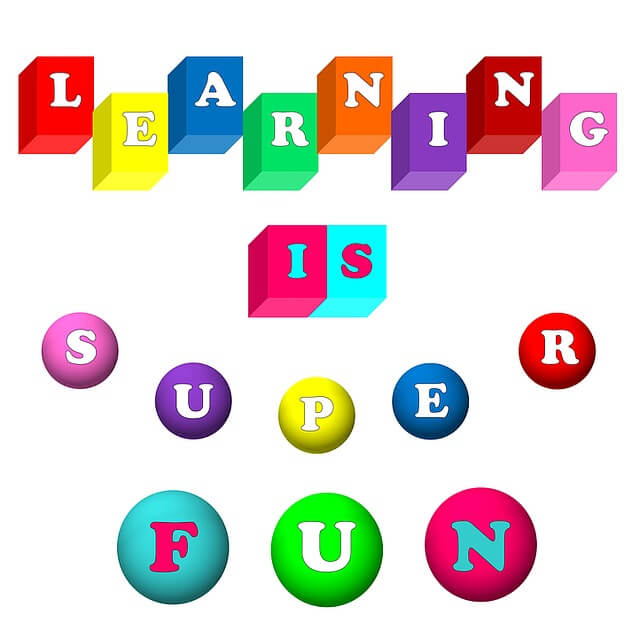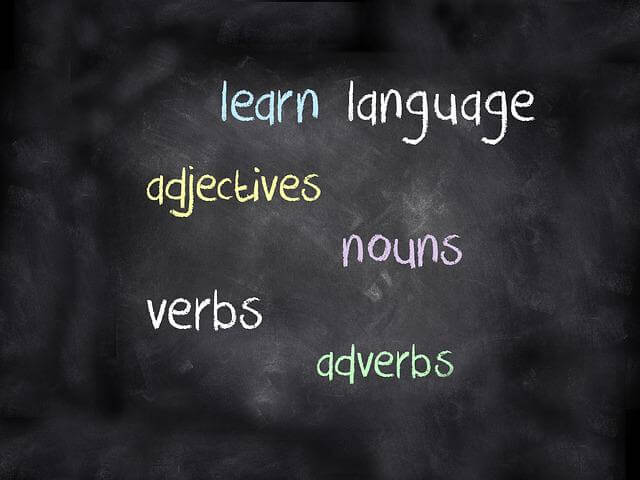grammar
المقررات الدراسية موسومة بـ "grammar"
Verbs
Learn about verbs and how theyare used.This course is ideal for intermediate learners.
Introduction
Verbs are ‘action’ or ‘doing’ words.Verbs are words that describe an action or talk about something that happens. They take many different forms depending on their subjects, the time they refer to and other ideas we want to express.Here are some examples of verbs in sentences:
· She runs to catch the train. (The verb is ‘runs’)
· David sings in the choir. (The verb is ‘sings’)
· We walked five miles to a garage. (The verb is ‘walked’)
· I cooked a meal for the family. (The verb is ‘cooked’)
You will learn
- Verbs
- Tenses
- Verb endings
- Common irregular verbs
Types Of Sentences
Learn about types of sentences that can be used. This course is ideal for intermediate learners.
Introduction
A sentence is a grammatical unit made up of one or more words. Sentences begin with a capital letter and end with a full stop, a question mark or an exclamation point.In this course we will be learning about the three main types of sentence:
· Simple
· Compound
· Complex
A simple sentence has one idea. It has a subject and only one verb.
For example:
The girl sprinted after the tiger (the verb is sprinted).
The cat purred (the verb is purred).
A simple sentence is one subject and one verb.
A complex sentence is formed when you join a main clause and a subordinate clause with a connective.
A subordinate clause is one that relies on a main clause to make sense.
The connectives in complex sentences tell us about the order or the place in which things happened or specify a cause or effect relationship between events (e.g. after, although, as, because, if, since, unless, when).
For example:
I love roast potatoes, although my mum prefers them boiled. (The connective is the word ‘although’.)
You need to prepare for the English test tomorrow if you want to get full marks. (The connective is the word ‘if’.)
You will learn
- Types of sentence
- Simple sentences
- Compound sentences
- Complex sentences
Summarising
Learn about summarising and what it is. This course is ideal for intermediate learners.
Introduction
Summarising involves taking the main ideas from a piece of text and rewriting them in your own words.
A summary tends to give an overview of a topic area. It should not contain unnecessary detail or be written like an essay.
Summarising is an important skill that is often used when researching, gathering or presenting information. Being able to write a good summary demonstrates that you have fully understood the text you are reading.
You will learn
- What summarising is
- Writing a summary
- Checklist
- Example summary
Spelling
Learn about why spelling is important and information on spelling. This course is ideal for intermediate learners.
Introduction
Knowledge of spelling and grammar will support you to correctly arrange words in sentences and add the correct punctuation. This will allow you to communicate efficiently with other people, your ability to spell, punctuate and produce grammatically- correct sentences in assessment is important.
· You are marked on your spelling· It aids communication
· It avoids confusion
· It helps you understand the patterns of language
· It helps you understand the connection between letter combinations and sounds which will help your reading
Can’t I just use a spell checker?
A spell checker such as (google translate) is only useful if you start the word correctly, getting most of the letters right.
It will not correct another legitimate word, for example, if you mis-type ‘does’ as ‘dose’ the spell checker will not pick this up.
A spell checker will not help if you are writing by hand.
You will learn
- Why spelling is important
- Commonly misspelled words
- Spelling strategy (look, cover, say, write and check)
- Homophones
- Silent letters
Paragraphs
Learn about paragraphs and how and when to use them correctly. This course is ideal for intermediate learners.
Introduction
A paragraph is a group of related sentences that develops one main idea, which is the topic of the paragraph.A paragraph is like a sandwich. The topic and concluding sentences are the two pieces of ‘bread’ enclosing the ‘meat’ in the supporting sentences.
The elements of a paragraph differ according to topic and purpose. Introductory paragraphs often contain definitions, while descriptive paragraphs include a lot of information. Other sentences may give examples, reasons and restatements.
3 of 13 – When to start a new paragraph
To remember when to start a new paragraph, use the TIPTOP rule which is, you move onto a new paragraph when you change the following:
- Time
- Place
- Topic
- Person
You will learn
- Organising paragraphs
- When to start a new paragraph
- Paragraph structure
- Paragraph content
- Unity in paragraphs
Tense
Learn about tense, what is meant by the past tense, present tense, future tense and how simple, continuous and perfect tenses work. This course is ideal for intermediate learners.
Introduction
In this course we are going to look at what the word tense means by looking at three different types of tense, namely past, present and future.In the English language when we talk about the tense of a word what we are really talking about is when the word (usually an action or an event) is taking place.
There are three main tenses in English and these are known as past, present, and future tenses – with one or two variations of these main three available to us, too.
By using the most appropriate tense in our sentences, we can then give the reader a better idea of when something happened, when it is going to happen, or even whether it is happening right there and then as they are reading the text.
You will learn
· Know what is meant by the past tense· Know what is meant by the present tense
· Know what is meant by the future tense
· Understand how simple, continuous, and perfect tenses work
Prefixes and Suffixes
Learn about prefixes and suffixes and what they are, examples of them and how to add them to a word. This course is ideal for intermediate learners.
Introduction
In this course we are going to look at what prefixes and suffixes actually are and think about the different ways we can use these add-ons in our writing.A prefix is something that you add on to the beginning of a word in order to change the word’s meaning.
There are a number of different prefixes available in the English language and each has its own meaning which then adds to the original meaning of a root word. A root word is a word in its most basic form before anything has been added to it (like a prefix, or even a suffix).
So we can think of prefixes like this:
prefix + root word = new meaning
You will learn
- Understand what a prefix is
- Know a number of different examples of prefixes
- Understand how to add a prefix to a word
- Understand what a suffix is
- Know a number of different examples of suffixes
- Understand how to add a suffix to a word
Active and Passive Voice
Learn about active and passive voice, what a verb is, what the passive and active voice is and when and where we use them. This course is ideal for intermediate learners.
Introduction
In this course we are going to look at what active and passive voices are when it comes to writing sentences, and how these tools are used in different ways.
When you are deciding whether a sentence is written in the active voice or the passive voice, an important language trick that will help you to work this out is spotting the verb in the sentence.Remember that when we talk about verbs we are really talking about doing words, or words that signal some kind of behaviour.
These can be physical behaviours: sing, run, jump, shout, wander.
But they can also be mental and spiritual behaviours: think, ponder, consider, exist, dream.
There are several different reasons for using the passive voice, including:· Not knowing who has performed a certain action
· It is obvious who has performed a certain action
· It is not important who has performed an action
· The person performing the action has been mentioned earlier
· The sentence is about people in general, rather than one person
You will learn
- Know what a verb is
- Understand what the passive voice is
- Understand what the active voice is
- Know when and where we use active and passive voices
Grammar Wars
Introduction
Common English Grammar Mistakes- 1) Present and Past Tense. ...
- 2) How To Avoid the Overuse of Adverbs. ...
- 3) Your/You're. ...
- 4) Misplacing Apostrophes. ...
- 5) There / Their /They're. ...
- 6) Confusing similar spellings and words. ...
- 7) Using incomplete comparisons. ...
- 8) Getting adjectives and adverbs confused
You will learn
- Common grammatical mistakes
- When to use ‘me’ or ‘I’
- When to use ‘were’ or ‘was











